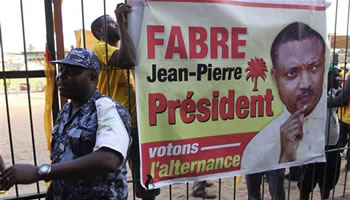Apr. 13 (GIN) – Togolese opposition leaders are issuing calls for change – the mantra of President Barack Obama – as they seek the end of the 50 year dynasty of the Gnassingbe family in Togolese politics.
Originally scheduled for April 15, a presidential election will take place April 25 after voter lists are checked as ordered by the Economic Community of West African States. Over 3.5 million voters are eligible to vote out of a population of nearly seven million.
Opposition parties said the list includes thousands of people who have registered twice and are likely to vote for the incumbent president.
President Faure Gnassingbe’s main challenger is Jean-Pierre Fabre, heading up the Combat for Political Change party who faces a difficult political landscape made up of 37 ethnic groups – the main ones being the Ewe in the south (40 percent of the population), the Kotokolis in the center and the Kabye people in the north (22 percent). The Ewe straddle the Togo-Ghana boundary.
Gnassingbe rose to power in 2005 after the death of his father, General Gnassingbe Eyadema, who ruled the tiny West African nation with an iron fist for 38 years. In recent months, opposition parties have tried to limit the number of five-year terms that a president can serve to two but the reform was blocked by Gnassingbe’s party.
At his party’s convention in February, which drew some 700 delegates, Gnassingbe modestly accepted his party’s backing to run for a third term.
“It is out of duty to our country Togo and trust in the ideals that we all share that I have the honor to accept to be invested as the presidential candidate of our (Union for the Republic) UNIR party,” he said. “I accept this nomination with a deep sense of humility.”
Years ago, Togo formed part of the Slave Coast, where captives were shipped abroad by European slavers during the 17th century. In 1884 it became the German protectorate of Togoland.
Political parties were legalized in 1991 and a democratic constitution was adopted in 1992.
In November and December last year, thousands of demonstrators took to the streets to demand term limits but were turned back by police firing tear gas.
According to Unicef, 73 percent of Togo’s rural population and 91 percent of the northern Savanes region, lives below the poverty line.
The Unicef website for Togo reads: The country is at a crucial point in its history. Another generation of children cannot be lost to poor services and abuses of their fundamental rights. National and international partners have a unique opportunity to ensure the health, education and social services for children in need in Togo.” w/pix of opposition candidate J-P Fabre








